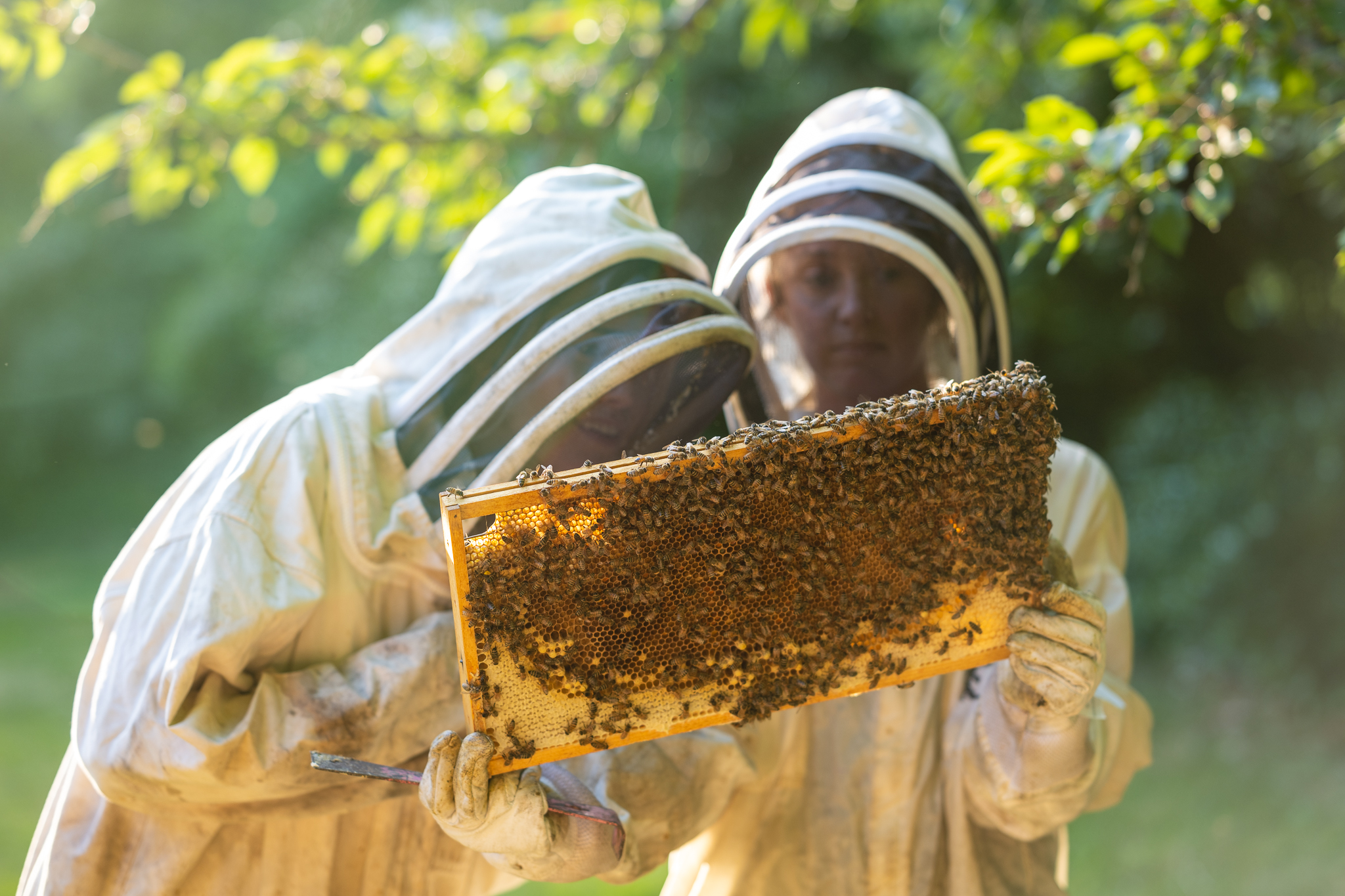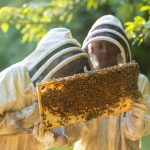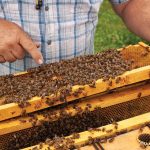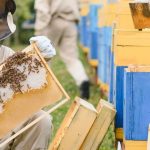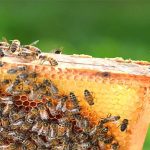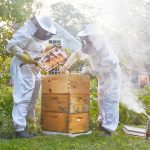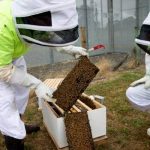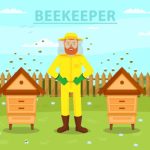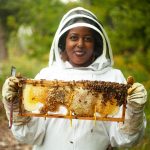1. Is Beekeeping Ethical?
Beekeeping ethics vary based on practices and perspectives. Many beekeepers prioritize the well-being of their colonies, ensuring proper care and minimizing stress. Ethical concerns may arise when commercial operations prioritize high honey production over the health of the bees or use harmful practices. Sustainable and humane beekeeping, where the bees’ needs are prioritized, aligns with ethical principles.
2. How Long Do Beekeepers Live?
The lifespan of beekeepers, like any profession, is influenced by various factors such as lifestyle, health habits, and genetics. On average, beekeepers do not have a distinct or predetermined lifespan compared to other occupations. However, the stress associated with managing colonies, potential exposure to bee stings, and other environmental factors may play a role. Beekeepers, like anyone else, can have diverse lifespans based on individual circumstances.
3. How Much to Start Beekeeping?
The initial cost of starting beekeeping can vary widely. Essential equipment such as hives, protective gear, and tools can range from a few hundred to a couple of thousand dollars. Additionally, costs may include purchasing bees and ongoing expenses for maintenance. Starting small and gradually expanding can help manage initial expenses. Beginners are advised to research and budget carefully to ensure a successful and sustainable start to their beekeeping venture.
4. How to Use Beekeeper’s Throat Spray?
Beekeeper’s throat spray is commonly used to soothe and protect the throat, especially for those exposed to beekeeping environments. To use, shake the bottle well and spray directly into the throat. It’s typically made with natural ingredients like honey and propolis, known for their soothing properties. Follow the product instructions for dosage and frequency. Consult with a healthcare professional if you have allergies or concerns before using such products.
5. How Much Does Beekeeping Cost?
The cost of beekeeping involves initial setup expenses, ongoing maintenance, and unforeseen challenges. Initial costs include purchasing hives, protective gear, and bees. Ongoing expenses cover feed, medications, and potential hive replacements. Beekeepers may also invest in education and training. While costs vary, beginners should budget for at least a few hundred to a couple of thousand dollars initially, with ongoing expenses based on the scale of their beekeeping operation.
6. Why Is St. Valentine the Patron Saint of Beekeepers?
St. Valentine is considered the patron saint of beekeepers due to a legend associating him with the sweetness of honey. According to the story, St. Valentine once cured a beekeeper’s child, leading the grateful family to gift him honey. This association with bees and honey contributed to St. Valentine becoming a symbolic figure for beekeepers, who may seek his protection and blessings for their hives and endeavors.
7. How to Become a Certified Beekeeper?
Becoming a certified beekeeper involves gaining knowledge and practical experience in beekeeping practices. Seek out local beekeeping associations or educational programs that offer certification courses. These courses cover hive management, disease prevention, and sustainable practices. Practical experience, mentorship, and passing certification exams are often part of the process. Certification adds credibility and demonstrates a commitment to responsible beekeeping practices.
8. How Much Do Beekeepers Earn?
Beekeeper earnings vary widely based on factors like scale, location, and business model. Small-scale hobbyist beekeepers may earn modestly through honey sales, while commercial operations with larger apiaries can generate significant income. Beekeepers may also diversify earnings through pollination services, beeswax, and hive-related products. Successful beekeeping businesses require careful management, dedication, and an understanding of market dynamics.
9. How to Become a Master Beekeeper?
Becoming a master beekeeper involves advancing beyond basic certification. Seek out advanced beekeeping courses, workshops, and hands-on experience to deepen your knowledge and skills. Many master beekeeping programs require a combination of education, practical experience, and passing rigorous examinations. Mentorship from experienced beekeepers can be invaluable. Achieving master beekeeper status signifies a high level of expertise and a commitment to advancing the field.
10. Can I Sue My Beekeeper Neighbor?
Legal action against a beekeeper neighbor depends on the specific circumstances and local regulations. If you believe the beekeeping practices are causing harm or nuisance, consider discussing concerns with your neighbor first. If issues persist, check local ordinances and consult legal advice to determine if there are grounds for a lawsuit. Communication and understanding local beekeeping regulations can often resolve conflicts without resorting to legal action.
11. What Is a Dearth in Beekeeping?
A dearth in beekeeping refers to a period when there is a scarcity of nectar and pollen sources for honeybees. This typically occurs between flowering seasons, impacting the bees’ ability to forage and collect food. Beekeepers need to manage dearths by providing supplementary feeding to maintain colony health. Understanding local flowering seasons and planning for potential dearths is crucial for successful beekeeping.
12. Why Must Beekeepers Fight?
The phrase “beekeepers must fight” may refer to the ongoing challenges in beekeeping, such as combating diseases, pests, and environmental threats. Beekeepers face constant battles to protect their colonies and ensure their survival. This involves implementing disease prevention measures, pest management strategies, and promoting sustainable practices. Fighting for the well-being of bees is essential to maintaining healthy hives and sustainable beekeeping practices.
13. How Hard Is Beekeeping?
Beekeeping difficulty varies based on factors such as experience, knowledge, and scale. While it can be challenging, especially for beginners, with proper education and mentorship, many find success. Managing colonies, understanding bee behavior, and addressing potential issues require ongoing learning. Beekeepers must be attentive, adaptable, and committed to ensuring the health and productivity of their hives.
14. How Expensive Is Beekeeping?
The expense of beekeeping depends on factors like scale, location, and equipment choices. Initial costs include hives, protective gear, and bees, ranging from a few hundred to a couple of thousand dollars. Ongoing expenses for feed, medications, and maintenance contribute to the overall cost. Beekeepers can manage expenses by starting small, budgeting wisely, and gradually expanding their operations based on experience and resources.
15. What Is a Super in Beekeeping?
In beekeeping, a super is a section added to the hive to provide additional space for honey storage. It usually contains frames where bees build honeycombs and store surplus honey. Supers can be added during periods of abundant nectar flow to encourage honey production. Beekeepers harvest honey from supers without disturbing the brood nest in the hive. Effectively using supers is a key aspect of maximizing honey yield in beekeeping.
16. What Is Dearth in Beekeeping?
In beekeeping, a dearth refers to a period when there is a shortage of available nectar and pollen for bees. This occurs when there is a lull between flowering seasons, impacting the bees’ ability to collect sufficient food. Beekeepers must be proactive during dearths, providing supplemental feed to sustain the colonies. Understanding and managing dearths are crucial aspects of successful beekeeping.
17. Do-It-Yourself Beekeeper Costume DIY
Creating a do-it-yourself (DIY) beekeeper costume can be a fun and creative project. To make a DIY beekeeper costume, you’ll need a white jumpsuit or coveralls, a veiled hat or hood, and gloves. Use lightweight materials for comfort. Add details like faux bees and a prop smoker for authenticity. This DIY project allows you to customize your costume while paying homage to the essential gear used by beekeepers.
18. Is Beekeeping Hard?
Beekeeping difficulty varies based on factors like knowledge, resources, and dedication. While it can be challenging, especially for beginners, proper education and mentorship can ease the learning curve. Beekeepers need to understand bee behavior, manage hive health, and address potential challenges. With commitment and ongoing learning, beekeeping can be a rewarding and enjoyable endeavor.
19. Do Beekeepers Have the Longest Life Expectancy?
There is no conclusive evidence suggesting that beekeepers have the longest life expectancy compared to the general population. Lifespan is influenced by various factors such as genetics, lifestyle, and healthcare. Beekeepers, like individuals in other professions, can have diverse lifespans based on individual circumstances. While the connection between beekeeping and longevity is not established, the activity itself is valued for its environmental impact and role in agriculture.
